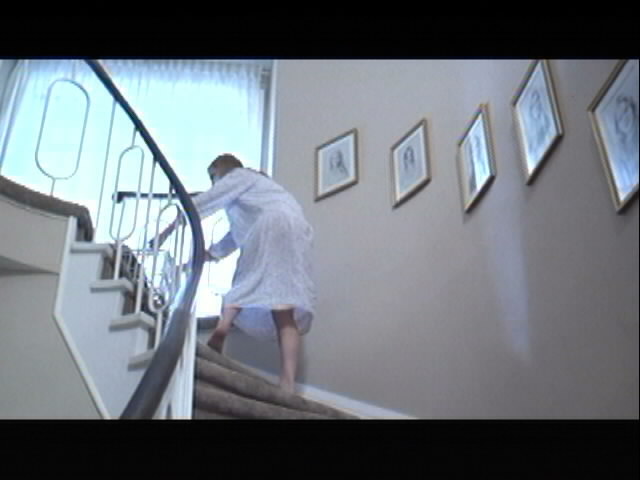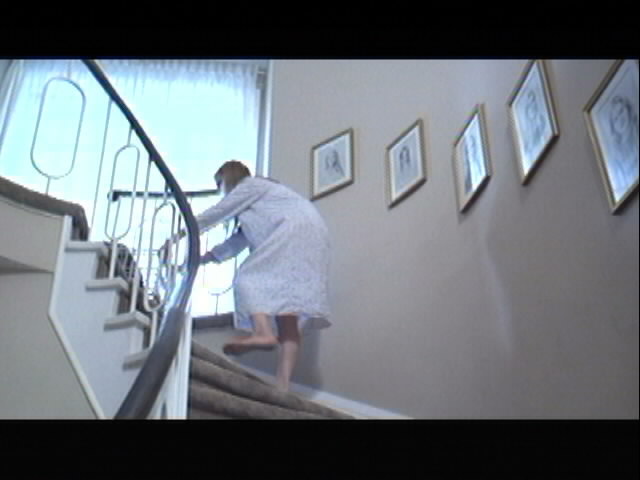
The Virgin Suicides is a novel of shared experience. Two separate groups dominate it: the men -- now "approaching middle age, a few of us balding" -- who recall their youth, and the five suicidal Lisbon sisters they knew back then. It is a novel about the almost unknowable opposite sex, desired but largely unattainable, always a mystery.
The choice of narrators -- a group rather than an individual, using the first person plural ("we") -- is an unusual one. Here men recall a time when they weren't yet fully formed as individuals, when experience was communal, shared and puzzled over together. Some of those included in the 'we' are identified by name, but the collective is of indeterminate size and composition. Individuals' experiences add to the story but are subsumed by it; most are merely variations on similar experiences common to middle-class suburban American life in that time (the mid-seventies or so). There are individual variations, but almost none when it comes to the Lisbon sisters, a feminine ideal in how they are shrouded in mystery and unattainable, and the boys' fascination with them -- lasting even into adulthood (a lost romantic ideal they can cling to) -- is the central shared one. The Lisbon sisters are (and remain) the mystery that is the opposite sex personified.
Just as the boys are one large group, so to are the Lisbon sisters, and sex and boys (or men) are no clearer to them. They are five very different girls -- and the narrators point out these differences -- and yet, more than not, they are simply 'the Lisbon sisters' -- and largely indistinguishable (much as all men probably are alike to them). On a rare occasion when they anticipate interaction with boys (to go to a dance) "the girls waited for the boys in individual ways" -- but once the boys arrive they meld together again:
their dresses and hairdos homogenized them. Once again the boys weren't sure which girl was which.It's not just that the boys have difficulty differentiating between them; the girls, too, see themselves as one. One keeps a diary, in which:
Cecilia writes of her sisters and herself as a single entity. It's often difficult to identify which sister she's talking about, and many strange sentences conjure in the reader's mind an image of a mythical creature with ten legs and five headsThey are, ultimately, also inseparable, unable to survive once they no longer are whole: the suicide of one ultimately leads the others to follow suit.
The Virgin Suicides is an odd reconstruction of that adolescent time, the narrators somewhat disturbingly obsessing about it. The book is a careful account of that year of suicides, and trophies from that period have been kept, "sacred objects" listed as Exhibits #1 through #97. Now, decades later, the trophies are fading and falling apart, however; the puzzle they thought they eventually could piece together instead growing more elusive -- a feeling nicely evoked by Eugenides. The narrative -- a detailed, close account, complete with interview-testimony from many of the main actors (some of whom the narrators have gone to considerable trouble to track down) -- is like a last effort to hold onto the story and try to make sense of the mystery.
The Virgin Suicides begins with several suicides: a brief mention of the last, and then, jumping back a year to where it all began, the first -- which was, in fact, a failed attempt rather than an actual suicide. There are five Lisbon sisters -- Cecilia, Lux, Bonnie, Mary, and Therese (aged, in order, thirteen through seventeen when the events begin to unfold) -- and it is Cecilia who does herself in first, in dramatic fashion.
The Lisbons -- the parents included -- are always a family apart. The suburbs are a hive of communal activity, and Eugenides describes many group-activities (especially of cleaning -- leave-raking, house-cleaning (there's an annual big fish-fly problem in town)), but the Lisbons remain largely separate. Only Mr.Lisbon is a bridge between family and community, but even that eventually breaks. A big part of the Lisbons' problem is their isolation, largely forced on them by the insanely protective Mrs. Lisbon.
A rare inversion of this is found in religion: the Lisbons go to church while -- surprisingly -- none of the narrators do:
None of us went to church, so we had a lot of time to watch them, the two parents leached of color, like photographic negatives, and then the five glittering daughters in their homemade dresses, all lace and rufffle, bursting with their fructifying flesh.The blanched parents (the mother especially) are too domineering, and what attempts there are at allowing the girls to live a normal life come too late. After Cecilia's first suicide attempt the Lisbons do allow a party to be held by the girls, and boys (including the narrators) are invited; it ends, of course, in disaster. A later second attempt at allowing the (surviving) girls a taste of normal teen life, when they are allowed to go to a dance with some boys, also goes wrong, leading to their complete and ultimately fatal isolation.
The suicides don't follow in a neat order, one sister after another dropping at regular intervals. It is Cecilia's that dominates the book. She was the youngest -- and already considered "the weird sister" -- and her death also sets her apart from the others; some choose to remember her "as apart, a freak of nature". Nevertheless, her act leads to the increasing isolation of the already always distant family which eventually culminates in the only release the surviving sisters can imagine (turning away from the alternative the narrators might be able to provide).
The suicides aren't all virginal, either; the youngest surviving sister, Lux, becomes a real slut, sleeping around (on the family roof no less) But sex offers neither satisfaction nor escape (beyond in the moment) for her. Nor for those who idolise the girls: the boy who started it all with Lux, Trip Fontaine, recounts: "I just got sick of her right then". Sex is the ultimate demythification; it's no wonder the other sisters choose death before it.

Eugenides offers a neat portrait of suburban American life in what seem like easier times. Like the Lisbon sisters, the entire community lives in a bubble (which the suicides help burst). It is a time of innocence; the first suicide appears merely to be an aberration, the world coming crashing down only a year later, when the other sisters follow suit.
Eugenides does make it too easy to blame the nutty, domineering parents that won't allow their daughters to be touched by real life, but it is a compelling picture he paints of this dysfunctional family. The odd approach -- the first person plural narrators, the communal memory -- generally works well: the voice is a convincing one, even -- or especially -- in all its uncertainty (despite all the years of pondering over these events). He's particularly good with objects: the house, the belongings, each examined as though it might be a piece of the puzzle. Eugenides does overdo description on occasion, starting well but going just a bit too far, as when he records a description of someone kissing Lux:
He tasted first the grease of her Chap Stick, then the sad Brussels-sprout flavor of her last meal, and past that the dust of lost afternoons and the salt of tear ducts. The peach schnapps faded away as he sampled the juices of her inner organs, all slightly acidic with woe.It's an odd book, with more artistry (or at least craftsmanship) than feeling, and too unlikely to be fully convincing -- yet with enough elements so true to life and well observed that it does provide repeated shocks of recognition. Worthwhile, and intriguing.










No comments:
Post a Comment
comments?